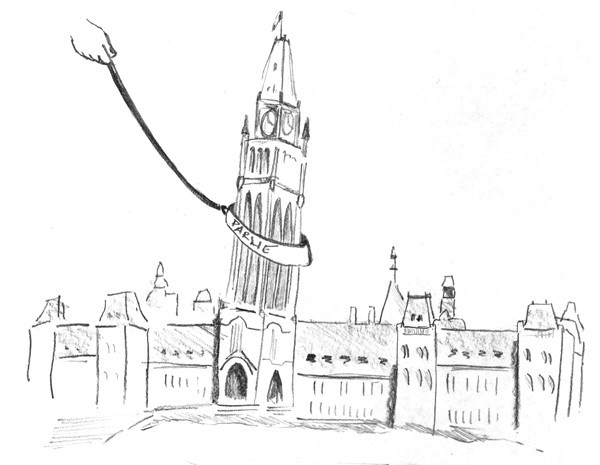Prorogation nation
At some point, prime minister’s contempt for Parliament should be addressed
A year after the word “prorogation” came into vogue after the great coalition fiasco of ’08, nostalgia seems to have gotten the better of Prime Minister Stephen Harper’s judgment. Hours before the calendar turned to 2010, Harper decided his last act of the first decade of the 21st century should encompass everything his legacy has been indicative of to this point.
Mediocre leadership, lack of any meaningful debate and a frightening inability to play well with others were all on full display with his decision to effectively shut down the public aspect of federal governance for two months.
Thus far, the latest suspension of Parliament has played out in the national media as nothing more than the latest chapter of Harper’s fondness for treating Parliament like his own personal fiefdom. While this is certainly true in the sense that it is unsurprising, what is deeply concerning is that Harper’s behaviour has been normalized to the extent that the most important federal political institution can simply be shut down on account of “Stephen being Stephen.” In Harper’s Parliament, any generic legislation can suddenly become election-triggering matters of confidence, the media can be ignored outright and Members of Parliament can be granted a reprieve from their public duties, ostensibly to enjoy the bloated spectacle of the Winter Olympics in Vancouver next month.
That this is a predictable political manoeuvre is indeed a fact very much worth noting. Globe and Mail columnist Jeffrey Simpson has even typified the latest prorogation as “completely Harperesque.” Those who wish to justify Harper’s actions have dusted off the fact that former prime minister Jean Chrétien prorogued a total of four times, the most notable of which being when he suspended the lower house to avoid the sponsorship scandal and pass its stench off to Paul Martin.
With such a recent history of PMs doing what they will with the levers of power they hold, there seems little initial reason to raise objections to Harper’s latest move.
Whether it was done to “recalibrate” Parliament – since the House of Commons is not an engine, we will have to see what exactly that means in the coming months – or to avoid the Afghan detainee issue, which the opposition was doing a poor job of criticizing the government for anyway, remains a mystery.
But if Harper suspended Parliament for the former reason, it seems trivial and superfluous after the opportunity provided by the winter parliamentary break. If the latter issue was the catalyst, he is no better than Chrétien for fleeing in the face of a political setback.
No matter the reason, it is becoming increasingly clear that Harper holds a great contempt for Parliament when it does not bend to his wishes. Just as he did in the fall of 2008 when he dissolved Parliament to call an election, and again in the winter of 2008, and now in the last moments of 2009, he has grossly misled Canadians as to the degree of dysfunction within Parliament and his government’s ability to rectify the situation.
He also lied about the nature of government in Canada by stating that a coalition would have been undemocratic since the prime minister and his government are elected by all Canadians, when the truth is that Canadians elect their Parliament only. As such, and as many constitutional experts have reminded us, the Liberal-NDP coalition with its sprinkling of Bloc Quebecois would have been legitimate, if not grossly ill-conceived.
That Harper’s actions have been fodder for supporters of the opposition is clear. Yet, at what point will his Conservative supporters begin to question the logic of granting his party the power to govern when they wish not to do so? Especially considering the amount of political grunt work that has now been lost due to the ending of this session of Parliament, it may be time to question whether Harper’s inability to overcome his megalomania is the best option for instituting a truly Conservative agenda.
Andrew Tod would very much enjoy “proroguing” schoolwork for awhile. Sadly, he lives in a world where failure to fulfill one’s obligations has consequences.







